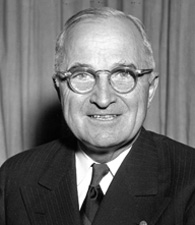Early on, it hardly seemed as if Harry S. Truman—a farmer, an army captain in World War I and a haberdasher—was on track to becoming president. He didn’t enter politics until he was nearly 40, but his career in that realm proved to be remarkably distinguished.
Harry Truman’s Early Days
Harry S. Truman was born on May 8, 1884, in Lamar, Missouri, the oldest son of John Anderson Truman and Martha Ellen (Young) Truman. Harry’s middle initial does not stand for an actual name, but is a compromise between the names of his two grandfathers, Anderson Shipp Truman and Solomon Young.
Harry’s family moved around a lot when he was young, first to Grandview in 1887, then Independence in 1890 and finally Kansas City in 1902. Harry graduated from high school in 1901 and worked a variety of jobs before returning to the family farm in Grandview.
He served in the Missouri National Guard from 1905 to 1911, and when the United States joined World War I in 1917, Truman was sent into France with the 129th Field Artillery. During the war effort, he was promoted to captain and commanded a unit in the Vosges, Saint Mihiel and Meuse-Argonne campaigns.
After returning from Europe, Truman married his childhood friend, Bess Wallace. The couple had one child, a daughter named Mary Margaret, in 1924. For three years, Harry ran a Kansas City clothing store that eventually failed, narrowly avoiding bankruptcy.
Sources in this Story
- Harry S. Truman Library and Museum: Harry S. Truman Biography
- The White House: Harry S. Truman
- The BBC: The men who bombed Hiroshima
- University of Virginia: Miller Center of Public Affairs: Harry S. Truman
- The Christian Science Monitor: Truman’s public deeds vs. his private diary
- Time: The World of Harry Truman
Truman’s Notable Accomplishments
In 1922, as an active member of the Democratic Party, Truman was elected a judge of Jackson County Court. He lost the 1924 election, but returned to serve as presiding judge from 1926 to 1930.
In 1934, Truman became a U.S. senator. Re-elected in 1940, he was appointed chairman of the Senate Special Committee to Investigate the National Defense Program. According to his official White House biography, his work with this committee eliminated $15 billion of unnecessary spending.
In the summer of 1944, Truman joined Franklin D. Roosevelt’s final bid for the presidency as the vice presidential candidate, and in January of the following year, he was sworn in as vice president. Less than three months later, Roosevelt died and Truman was sworn in as the 33rd president of the United States.
Truman’s first year in office was perhaps his most definitive. With World War II coming to a close on the European front, Truman made the difficult decision to drop two atomic bombs on Hiroshima, Japan, in August of 1945, an action that ultimately led to the Japanese surrender.
The next few years of Truman’s presidency concentrated on developing foreign relations. The Marshall Plan helped struggling European economies get back on their feet, while the Truman Doctrine pledged military support to any country facing a communist intrusion.
In 1948, Truman ordered the Berlin airlift in response to the Russian blockade of West Berlin. He also continued negotiations for what would eventually become the North Atlantic Treaty Organization (NATO).
The Man and His Work
- “The Autobiography of Harry S. Truman,” by Harry S. Truman, Robert H. Ferrell
- “Where the Buck Stops: The Personal and Private Writings of Harry S. Truman,” by Margaret Truman
- “Truman,” by David McCullough
Domestically, Truman aimed to avoid economic recession while expanding the social programs initiated by Roosevelt. Several of his proposals were voted down by the mainly Republican Congress, but Truman was able to establish the Committee on Civil Rights and oversee the desegregation of the armed forces.
Truman publicly battled prejudice and racism, but according to an article in The Christian Science Monitor, his personal views on the issue were quite a different matter.
The Rest of the Story
Truman left the White House in 1953, and spent the last two decades of his life relaxing in the luxury of everyday life in his hometown of Independence, Missouri. He passed away on December 26, 1972, at the age of 88. As he had previously requested, his body was buried in the courtyard of the Truman Library.
In the last months of Truman’s second term, Winston Churchill remarked to the president, “I misjudged you badly. [Y]ou, more than any other man, have saved Western civilization.” A 1973 obituary in Time magazine elaborated on how many of Truman’s contemporaries underestimated him and his work during his lifetime.











